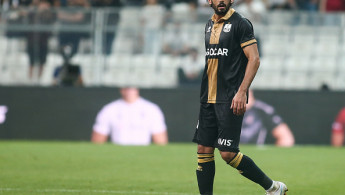Israeli minister wants Palestinian footballer's citizenship revoked over minute silence for Gaza
An Israeli minister has called for a Palestinian footballer's citizenship to be revoked after he joined a minute of silence for the thousands of victims of Israel's war on Gaza.
Palestine national footballer, Ataa Jaber, observed the minute silence during a World Cup 2026 qualifier game between Palestine and Lebanon last week.
The gesture drew the ire of Culture and Sports Minister Miki Zohar, who wrote to Interior Minister Moshe Arbel requesting that Jaber’s citizenship be revoked over his "clear identification with terrorists".
"On November 16, 2023, the Israeli citizen and soccer player Ataa Jaber participated in a match as part of the 2026 World Cup qualifiers in the United Arab Emirates where he represented the team that calls itself ‘Palestine’ against the Lebanese team," Zohar wrote, according to The Times of Israel.
"During the game, Jaber expressed identification with the enemy when he stood for a minute of silence in memory of ‘the victims in Gaza’ while ignoring the murdered on the Israeli side and identifying with the Nazi terrorist organization Hamas."
Global protests in solidarity with Palestinians have been branded as "pro-Hamas" by Israel and its supporters.
Israel's assault on Gaza has killed over 12,000 Palestinians, including over 5,500 children, according to the enclave's ministry of health.
"We are required to show zero tolerance toward terrorism supporters and to use a heavy hand against any Israeli citizen who expresses support for the enemy," Zohar’s letter continued.
Jaber, who has played for several Israeli clubs, is from the Palestinian town of Majd al-Krum, which falls today within the borders of Israel.
He has said in previous interviews that his decision to play for Palestine rather than Israel was because he wanted to "convey a message to [Palestinian] players inside the green line [inside Israel] that this choice is available to them".





 Follow the Middle East's top stories in English at The New Arab on Google News
Follow the Middle East's top stories in English at The New Arab on Google News
![The UAE is widely suspected of arming the RSF militia [Getty]](/sites/default/files/styles/image_330x185/public/2024-11/GettyImages-472529908.jpg?h=69f2b9d0&itok=Yauw3YTG)
![Netanyahu furiously denounced the ICC [Getty]](/sites/default/files/styles/image_330x185/public/2024-11/GettyImages-2169352575.jpg?h=199d8c1f&itok=-vRiruf5)
![Both Hamas and the Palestinian Authority welcomed the ICC arrest warrants [Getty]](/sites/default/files/styles/image_330x185/public/2024-11/GettyImages-2178351173.jpg?h=199d8c1f&itok=TV858iVg)